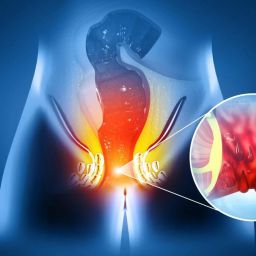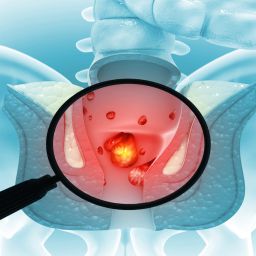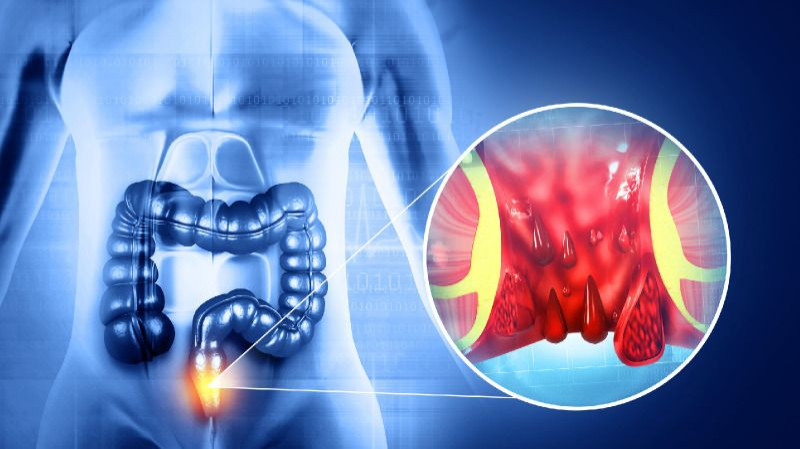
Symptoms of Hemorrhoids During Pregnancy
The symptoms of hemorrhoids during pregnancy can range from mild to severe. Not all pregnant women will experience hemorrhoids, but those who do may exhibit a combination of the following symptoms:
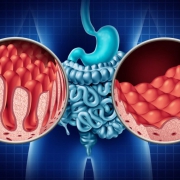
- Pain and Discomfort: Pain is most often associated with external hemorrhoids. The pain may be sharp or aching, especially when sitting or during bowel movements.
- Bleeding: Internal hemorrhoids are often the cause of painless bleeding. This bleeding is usually seen as bright red blood on toilet paper or in the toilet bowl after a bowel movement. Although this is a common symptom, it is important to rule out other more serious conditions, such as anal fissures or rectal cancer.
- Itching and Irritation: External hemorrhoids may cause itching around the anus due to inflammation and swelling. This sensation can worsen with hygiene products or irritation from tight clothing.
- Swelling and Lumps: Swelling around the anus is common in both internal and external hemorrhoids. External hemorrhoids may feel like lumps or bumps near the anal opening, which can cause significant discomfort.
- Mucus Discharge: Occasionally, hemorrhoids may produce a mucus discharge, which can contribute to irritation and discomfort.
Causes of Hemorrhoids During Pregnancy
Several factors contribute to the development of hemorrhoids during pregnancy. These include physical, hormonal, and lifestyle changes that occur as a result of pregnancy:
- Increased Pressure from the Uterus: As the uterus expands, it places pressure on the veins in the pelvic region, particularly the rectal veins. This pressure impedes blood flow, leading to swollen veins and hemorrhoids.
- Hormonal Changes: During pregnancy, the body produces increased levels of the hormone progesterone. This hormone helps to relax the walls of blood vessels, making them more prone to swelling and engorgement, which can lead to hemorrhoids.
- Constipation: Pregnancy hormones can slow down the digestive system, resulting in constipation. Straining during bowel movements can increase the pressure on rectal veins, contributing to the development of hemorrhoids.
- Increased Blood Volume: Pregnancy causes an increase in blood volume to support both the mother and the developing baby. This increased blood flow can cause veins to enlarge, potentially resulting in hemorrhoids.
- Prolonged Sitting or Standing: Many pregnant women experience physical discomfort from prolonged periods of sitting or standing, which can exacerbate hemorrhoid formation due to sustained pressure on the pelvic region.
Management Strategies for Hemorrhoids During Pregnancy
Managing hemorrhoids during pregnancy involves a combination of lifestyle changes, natural remedies, and medical treatments. Effective management can alleviate symptoms and prevent hemorrhoids from worsening. Below are several strategies for managing hemorrhoids during pregnancy:
1. Dietary Changes
A healthy diet plays a crucial role in managing hemorrhoids during pregnancy, especially in preventing constipation, which is a major risk factor.
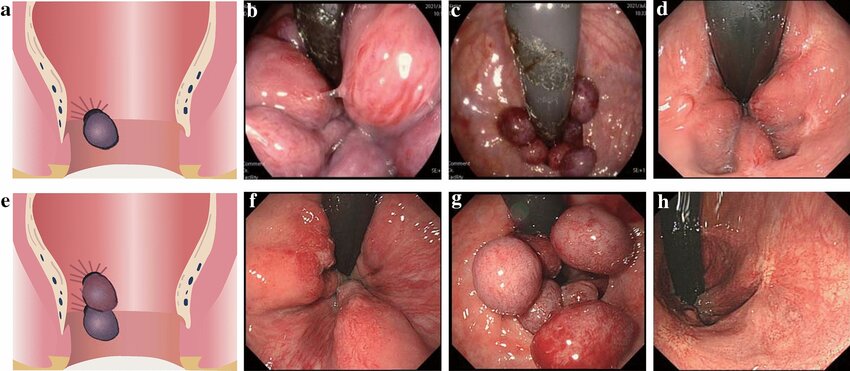
- Increase Fiber Intake: Eating a diet rich in fiber can help soften stool, making bowel movements easier and reducing the strain on rectal veins. Fiber-rich foods include fruits, vegetables, whole grains, beans, and legumes.
- Stay Hydrated: Drinking plenty of water is essential for maintaining proper digestion and preventing dehydration. When your body is well-hydrated, it helps soften stool and makes it easier to pass.
- Avoid Processed Foods: Processed foods often lack fiber and can contribute to constipation. Reducing processed foods and foods that are low in fiber will support healthy digestion.
2. Proper Bowel Habits
Certain bowel habits can make a significant difference in managing hemorrhoids during pregnancy.
- Don’t Delay Bowel Movements: If you feel the urge to go, it’s important to avoid holding it in. Delaying bowel movements can lead to constipation and harder stool, which can worsen hemorrhoids.
- Avoid Straining: Straining during bowel movements is one of the leading causes of hemorrhoid flare-ups. Try not to force bowel movements and give yourself time to go naturally.
- Use a Footstool: Elevating your feet with a small footstool while sitting on the toilet can help align your pelvis, which can reduce pressure on the rectal area and make bowel movements easier.
3. Sitz Baths
Sitz baths are a simple and effective way to relieve hemorrhoid symptoms, especially for external hemorrhoids. A sitz bath involves soaking the anal area in warm water.
- How to Use: Fill a tub or basin with warm water, sit in it for 15 to 20 minutes, and repeat this process several times a day, especially after bowel movements. This helps reduce swelling and soothes irritated tissues.
- Add Epsom Salt: Adding Epsom salt to the water can enhance the soothing effects and provide additional relief from inflammation.
4. Cold Compresses
Cold compresses can be used to reduce swelling and provide immediate relief from pain or itching.
- How to Use: Wrap an ice pack or cold compress in a cloth and apply it to the anal area for 10 to 15 minutes. Cold therapy helps constrict blood vessels, reducing inflammation and providing temporary relief from pain.
5. Topical Treatments
There are several over-the-counter (OTC) creams, ointments, and suppositories available to provide relief from hemorrhoid symptoms. Some common ingredients include:
- Witch Hazel: Witch hazel is an anti-inflammatory agent that can help reduce swelling, pain, and itching around the anus.
- Hydrocortisone Creams: Hydrocortisone is a mild corticosteroid that can help reduce inflammation and relieve itching and discomfort. Always consult your healthcare provider before using any topical treatment.
6. Exercise and Physical Activity
Regular physical activity is essential for maintaining good circulation and bowel function during pregnancy.
- Walking and Swimming: Light exercises such as walking and swimming can improve blood flow and prevent constipation, both of which are crucial for managing hemorrhoids.
- Avoid Prolonged Sitting or Standing: Prolonged periods of sitting or standing can increase pressure on the rectal veins. Taking short breaks and moving around every 30 minutes can improve circulation and reduce discomfort.
7. Wear Loose Clothing
Tight clothing, especially around the waist, can put additional pressure on the pelvic area, worsening hemorrhoid symptoms.
- Choose Loose, Comfortable Clothing: Opt for loose-fitting clothes that don’t restrict blood flow. Cotton underwear is particularly helpful in keeping the area dry and preventing irritation.
8. Medical Treatment
While most hemorrhoids during pregnancy can be managed with lifestyle changes and natural remedies, there are situations when medical intervention is necessary.
- Prescription Medications: In some cases, doctors may prescribe stronger medications to reduce inflammation or provide pain relief.
- Surgical Treatment: Surgical intervention is rare and generally only considered if hemorrhoids cause severe symptoms or complications. Procedures such as rubber band ligation or hemorrhoidectomy may be considered in extreme cases, though surgery is typically avoided during pregnancy unless absolutely necessary.
Preventing Hemorrhoids During Pregnancy
Preventing hemorrhoids is often easier than treating them once they’ve developed. Here are some effective prevention tips:
- Maintain a High-Fiber Diet: Eating foods high in fiber helps prevent constipation, which is a significant risk factor for hemorrhoid development.
- Drink Plenty of Water: Staying hydrated helps prevent constipation and ensures that stool is soft and easy to pass.
- Exercise Regularly: Engaging in regular physical activity, such as walking, can improve circulation and help prevent the development of hemorrhoids.
- Avoid Prolonged Sitting or Standing: Taking breaks from sitting or standing for long periods can reduce the risk of hemorrhoids by improving circulation.
- Practice Good Hygiene: Keeping the anal area clean and dry helps prevent irritation and infection. Use gentle, unscented wipes instead of toilet paper, and avoid excessive wiping.
Hemorrhoids during pregnancy are common but treatable. While they can cause significant discomfort, the condition can usually be managed with simple lifestyle changes, natural remedies, and medical treatments. By following the tips outlined in this article, pregnant women can reduce the severity of hemorrhoid symptoms and prevent further complications.

